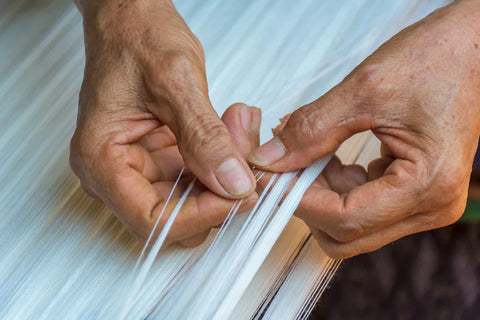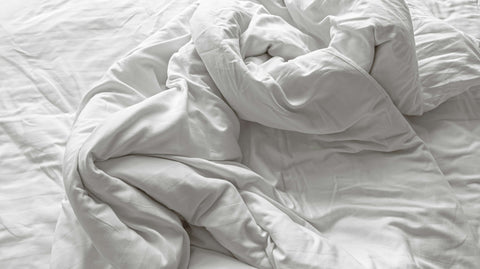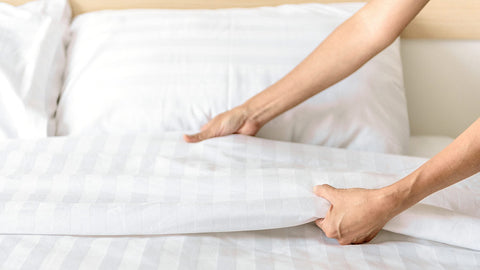
When it comes to choosing the best bedding, the duvet cover often gets overlooked. Yet, selecting the right duvet cover is crucial to creating your ideal sleep environment. The duvet cover serves as a protective layer, helping to keep your duvet clean. It also adds to your bedroom's aesthetic. Most importantly, the duvet cover affects your sleep, so picking the right one is key to maximizing your comfort, temperature regulation, and overall sleep quality. If you're wondering how to choose bedding, one of the main features to consider when choosing a duvet cover is its thread count. Our Duvet Thread Count Guide explains why this number matters, its impact on comfort and durability, and how to select the right duvet cover for you.
Yumerest's cloud-like fluffy duvets will help you achieve your goals by enhancing your sleep quality and creating the perfect sleep environment.
What Is Thread Count and How Does It Affect Your Duvet Cover Quality

Thread count refers to the number of threads woven into one square inch of fabric. It includes both horizontal threads and vertical threads. In weaving, vertical threads are called warp threads, while horizontal threads are referred to as weft threads.
Both play crucial roles in determining the fabric's structure and strength. The fabric's density depends on how tightly warp threads are interwoven with weft threads. Essentially, thread count measures fabric density, but it doesn’t tell the whole story about sheet quality.
Thread Count vs. Fabric Quality
A higher thread count can mean a softer, smoother sheet, but only when the threads themselves are of high quality. Using inferior cotton or synthetic blends can result in stiff, heavy sheets even with a high thread count.
On the other hand, premium fabrics like Egyptian cotton or long-staple cotton offer unmatched softness and breathability, even at moderate thread counts.
How Does Thread Count Affect Duvet Covers?
The thread count significantly influences the feel and durability of a duvet cover. Here are some key points to consider:
-
Comfort: Higher thread counts often result in a softer feel against the skin. Fabrics with a thread count between 300 and 600 are typically considered luxurious.
-
Durability: A higher thread count can increase the durability of the duvet cover, making it less likely to wear out quickly.
-
Breathability: While higher thread counts can provide softness, they may also reduce breathability. A tightly woven fabric can trap heat and moisture, leading to discomfort during sleep.
Is A Higher Thread Count Better?
Most people assume a higher thread count means a better product, but this isn’t always the case. More tightly woven fabrics may feel softer, but they’re often heavier than their lower thread count equivalents.
This usually gives sheets and duvet covers a more premium feel, but it isn’t ideal if you’re buying bedding for the summer. Items with a higher thread count are also more likely to limit airflow and breathability, and are best avoided if you struggle to stay cool at night.
Why Yarn Quality and Weave Matter
There are other factors to consider as well. It’s important to remember the adage ‘quality over quantity’, as the quality of yarns is more important than their quantity, or thread count.
The weave or the pattern of threads is also key. For example, a percale or plain weave sheet tends to have a lower thread count than a sateen weave sheet by its very nature.
Then There’s Workmanship To Consider
A high thread count doesn’t guarantee that your bedding has been made to the highest standard. Some thread counts may also be inflated by using double- or triple-ply threads.
Counting multiple fibres in a single thread can instantly multiply thread counts to make them appear more luxurious. Multi-ply yarns usually aren’t as soft, breathable, or hard-wearing as single-ply alternatives.
Related Reading
- Why Are My Sheets Itchy
- Are Microfiber Sheets Good for Skin
- Are Bamboo Sheets Hypoallergenic
- Do Bamboo Sheets Wrinkle
- Why Are Duvet Covers So Expensive
In-Depth Duvet Thread Count Guide for Premium Sleep Quality

Many shoppers believe that a higher thread count automatically means better quality of bedding. This is false. The optimal thread count for bedding depends on personal preference and the type of fibers used.
Ideal Thread Counts for Bedding and Duvets
A good rule of thumb is that a thread count of 200 to 800 is considered suitable for bedding. Sheets with a thread count above 800 may have a denser weave, but they may not necessarily be more comfortable.
Duvet shells with a thread count of over 280, filled with either goose or duck down, are premium quality and durable. Whereas if the duvet is filled with feathers, the ideal thread count is 240; anything above that, the feathers will poke through the fabric.
Thread Count Ranges for Down Duvets
There are three ranges of thread count typically used in the manufacturing of down duvets and comforters:
-
Light
-
Medium
-
Heavy
Refer to our table below for a more unambiguous indication of which range is a better match for your bed.
Light
-
Thread Count: 300 - 500
-
Qualities: Soft, thin, and light, weighing between 4 and 5 pounds, providing basic durability.
-
Best Suited For: This range is best suited for individuals who are warm sleepers or live in a warmer climate, where additional insulation may not be necessary.
Medium
-
Thread Count: 500 - 800
-
Qualities: Soft, has an average weight and thickness, weighs between 6 and 7 pounds, and provides a good level of durability.
-
Best Suited For: A medium-range down duvet or comforter is better suited for individuals living in a temperate climate. A down duvet with a thread count between 500 and 800 will provide sufficient comfort and warmth without being overly heavy.
Heavy
-
Thread Count: 1000 - 1500
-
Qualities: Very soft, thick, and heavy, weighing between 9 and 10 pounds, it is highly durable.
-
Best Suited For: A down duvet or comforter with a high thread count above 1000 is best suited for those who live in very cold climates and rely on excellent insulating properties to keep them warm during even the coldest of winter nights.
|
Range |
Thread Count |
Qualities |
Best Suited For |
|
Light |
300 - 500 |
Soft Thin
|
This range is best suited for those who are warm sleepers or live in a warmer climate, where additional insulation may not be necessary. |
|
Medium |
500 - 800 |
|
A medium-range down duvet or comforter is better suited for individuals living in a temperate climate. A down duvet with a thread count between 500 and 800 will provide sufficient comfort and warmth without being overly heavy. |
|
Heavy |
1000-1500 |
|
A Down duvet or comforter with a high thread count above 1000 is best suited for those who live in very cold climates and rely on excellent insulating properties to keep them warm during even the coldest of winter nights. |
A Good Rule of Thumb for Down Duvets
A good rule of thumb to follow is that any down duvet or comforter made from high-quality cotton and featuring a thread count of over 250 will provide the quality you’re looking for. Many comforters and duvets with a thread count of 400 or higher are considered luxury bedding products.
The Best Material for Duvet Covers
Cotton is the most common material used for bedding, available in a range of thread counts. Highly prized Egyptian cotton is renowned for its long and strong fibers, which can be woven into high-quality single-ply fabric with a high thread count.
Our Maxwell Sheets are a great example of this, as they are made from soft Egyptian cotton fabric and come in a variety of colors. On the contrary, lower quality cotton may have a higher thread count but feel rough to the touch.
Single-Ply vs. Multi-Ply Fabrics
It is essential to check if the fabric is single-ply or multi-ply. Single-ply fabrics refer to fabrics that are woven from a single yarn or thread. In contrast, multi-ply fabrics are woven from multiple yarns twisted together.
Single-ply fabrics tend to be lighter and more breathable than multi-ply fabrics. Our staple bedding collection features single-ply fabrics and high-quality, long-staple cotton. Anything above 700 thread count is a multi-ply fabric that often uses poor-quality cotton and tends to be rough to the touch, making it uncomfortable to sleep on.
Other Factors to Consider When Shopping for Bedding
Thread count is a valuable consideration when shopping for bedding, but it’s not the only factor to consider. Single-ply fabrics can be an excellent choice for those seeking high-quality, lightweight, and comfortable sleeping fabrics.
When selecting bedding, consider your personal preferences, budget, and sleep needs. This is why we offer a range of thread counts for single-ply fabrics. Ultimately, our single-ply fabrics are the best choice for you, offering a comfortable feel that helps you get a restful night’s sleep.
Related Reading
- What to Look for in a Down Comforter
- Duck Down vs Goose Down
- Bed Sheet vs Bed Cover
- What Comes in a Sheet Set
- Best Time to Buy Sheets
- What Color Bed Sheets Should I Get
Other Factors to Consider Beyond Thread Count

Durability is dependent on maintenance. If you’re searching for a duvet that is durable and will last for a long time, the thread count range will come into play, as will how you maintain and care for your duvet.
Durability is dependent on how the product is maintained and used. If you wash your duvets and comforters regularly, it could damage the materials and compromise the product’s ability to insulate. Down comforters and duvets should only be cleaned at least once a year. Any more than this and you may be doing more harm than good.
The Fabric Makes All the Difference
For the finest and most luxurious bed sheets, consider the fabric used to make them. 100% organic, fine yarn single-ply cotton is the premium choice, as it’s naturally hypoallergenic, breathable, soft, comfortable, and easy to care for.
It washes incredibly well and can even become more sumptuous over time. Cotton hemp blends also offer additional antibacterial properties, making them an exceptional choice for promoting sleep hygiene.
Thread Count Guide for Cotton, Bamboo, and Linen
You may come across bed sheets crafted from bamboo or linen, both of which can also be measured using thread count. Bamboo is inherently very soft, so a lower bamboo thread count can feel just as gentle as high thread count bed linen made from cotton.
Pure linen is even harder to judge by thread count, as the weave is far looser than cotton, so it doesn’t indicate the quality. As a guide, our experts recommend the following as the best thread counts for bedding:
-
Cotton: 300-600
-
Bamboo: 250-350
-
Linen: 80-140
Luxury Fabrics That Go Beyond Thread Count
In addition to the fabrics measured by thread count, various types are not, such as silk, microfibre, and flannel. Each has its unique properties and craftsmanship that contribute to a luxurious feel.
Silk has a natural sheen and smooth texture, while microfibre is incredibly soft and lightweight, and flannel has a fuzzy finish that’s ideal for cooler months. In these cases, the quality of the fabric is more important than the quantity of the threads.
Weave Matters: The Structure of Your Bed Linen
Two of the most common weaves you may come across when researching the best thread count for bedding are percale and sateen. The weave refers to the construction of the fabric, specifically the patterns of the threads. This makes a difference not only to the thread count but also to the look, feel, and finish of the material.
Percale involves a simple ‘one over, one under’ technique with fewer threads per square inch. This produces a matte finish and the crisp, light, high-quality feel found in our Cotton Collection 400TC range. Sateen features a complex alternating pattern with more threads, resulting in the exquisitely soft feel and luxurious sheen finish of our Cotton Collection 600TC range.
Don’t Forget Your Bed Accessories
There is little point investing in the most luxurious bed linen if the rest of your bed accessories aren’t equally as beautiful. You could have the softest sheets in the world, but if you’re lying on a lumpy mattress or dozing under a duvet that’s past its prime, you certainly won’t be getting the best out of bedtime.
To create a truly decadent bed that you can’t wait to relax into, you need the plumpest of pillows for the perfect amount of support and comfort, coupled with a delicious duvet filled with the deepest down.
Get Deep Sleep Every Night with Our Cloud-like Soft Fluffy Duvets
When choosing a duvet, most people focus on the filling, but the fabric’s thread count also significantly affects your comfort. A higher thread count means a softer, denser fabric that may trap heat instead of dispersing it.
PureFlow Duvet: Cloud-Like Comfort for Restful Sleep
Yumerest's PureFlow Duvet transforms your bedroom into a luxurious sanctuary, enveloping you in cloud-like softness with its exceptional 5kg filling, which promotes more profound and more restorative sleep.
Crafted by expert artisans using techniques perfected since 1946, our duvets combine traditional craftsmanship with modern innovation to deliver an unparalleled sleeping experience.
Your Complete Sleep Sanctuary
The PureFlow bundle, featuring our heavenly duvet, elegant cover, and calming sleep mist, creates a complete sleep sanctuary that helps busy professionals and parents finally achieve the rejuvenating rest they deserve.
Enjoy deep sleep every night with our cloud-like fluffy duvets.
Related Reading
- How Long Do Bed Sheets Last
- GSM vs Thread Count
- Microfiber vs Flannel Sheets
- Best Egyptian Cotton Sheets
- Best Sheets for Sensitive Skin







